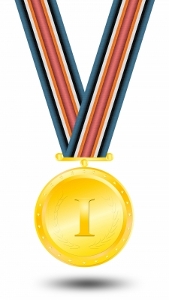I explore rewards that give mechanical and non-mechanical bonuses.
Mechanical bonuses directly increase PC powers like attack, damage and skills.
I read an interesting article on Critical Hits named D&D 4e’s Classic Rewards.
It got me thinking: the type of rewards have a large impact on how the game is played.
My focus is on 4E but this essay is usable for other D&D editions.
Experience
 |
| Gold medal from freedigitalphotos.net |
Experience (XP) is the most common reward in D&D.
It allows PCs to level up, unlocking new powers and making existing powers better.
PCs at higher levels also face other challenges like stronger monsters, more impact of their choices, etc.
XP can be given after each combat, but also after completing a quest.
If a quest can be solved by diplomacy and combat and both solutions give the same XP, diplomacy is often preferred. It's easier, less dangerous and faster for the players.
If more XP is given than the the guidelines dictate, PCs level faster.
This may overwhelm the players but also gives them a feeling of power.
Slower XP may frustrate players if there are no other rewards.
It is better for keeping PCs at lower levels and focusing on other rewards.
Gold
Gold allows PCs to buy items needed for adventuring.
It comes in many forms:
- copper pieces, silver pieces, gold pieces, etc.
- gems (amethyst, topaz, emerald, sapphire, diamond)
- art objects (artwork like paintings, statues)
- jewelry like amulet, crown, ring, tiara)
- trade goods like food, metals, furs, hides
PCs need to sell non-gold rewards unless they can barter them.
This pushes PCs into hitting markets or hearing around town for specific buyers.
The non-gold reward tells something about the person they acquired it from.
This sets the tone for the adventure, gives opponents more depth and is even a possibility for quests.
Magic Items
Magic items are valued by PCs. DMs decide what magic items the PCs have access to.
This influences how players play.
For example: magic items that help stealing things encourages PCs to steal things.
Magic items with bonuses against creature types gives PCs incentive to fight those creatures.
Magic items with powers give the players more options in combat.
Having more options is good at lower levels, but may become complex at higher levels.
Common magic items don't have that problem.
PCs with a lot of magic items will rely more on them.
This means the focus of characters shift from the characters to their magic items.
There is nothing wrong with that, it's just a different play style.
An alternative is inherent bonuses or magic items/artifacts that become stronger when PCs get stronger.
Quests
Quests come in many forms and can be considered as a reward.
For example:
- deed to ships, lands, treasure maps
- set of trials leading to more power (like magic items or artifacts)
- personal quests corresponding to PCs backgrounds
Quests often have additional XP as a reward.
This promotes achieving the goal in the simplest way possible.
Giving out quests as a reward gives players more options to choose from.
These make for interesting side-trips and make players feel more in control.
Rituals
PCs can be rewarded with rituals, ritual components or ritual scrolls.
Alchemy and magic armour components are also possible.
This promotes their usage.
Storytelling Rewards
Storytelling rewards are often under appreciated:
- Influence: knowing important NPCs, NPCs noticing the PCs existence.
- Responsibility: lead organizations like wizard academies, thieves guilds, town militia, cities, estates, shops.
- NPCs cheering in the street: the effort PCs do in their adventures shouldn't go unnoticed. NPCs know of them through tales or throw parades for them. This is all assuming the party is not evil.
- Castle: getting a castle or home base is something personal for PCs.
At higher levels it might even be a planar-traveling fortress or airship.
Boons
The Dungeon Master Guide 2 offers interesting alternative treasures called boons, things like:
- divine favours
- grandmaster training
- legendary secrets
The Dungeon Master Guide 2 explains it better than I ever could.
Power boost after combat
At the beginning of a day, PCs have all of their powers and spells.
These decrease during play.
This leads to players wanting to rest often to be at maximum strength.
Rewards are given to counteract this behavior:
- Magic items get more powerful the more combat there was this day (milestones in 4E).
- PCs get power boosts (action points in 4E).
Do you use other rewards? Do you use special storytelling or quest rewards?
I actually don't consider XP as a reward. For me, a reward is something you get over and above what you are expecting. You expect XP and maybe a little coin. To me, a lot of coin would be a reward.
ReplyDeleteRoger, thanks for replying.
DeleteYou're correct, D&D with normal XP would be expected for players.
If you give more XP, it is considered a reward.
If players get more XP for an action, they might change the way they act.
For example: players expect XP for combat, but not for role playing.